White Anti-Racist Reading List (A Starter)
- Jun 3, 2020
- 18 min read
So you are white and ready to jump into anti-racism work? Glad you're here!
We've compiled a reading list for white folks -- both those who are just starting out on their journey toward anti-racism, and those who are further along and want to deepen their understanding and anti-racism activism and practices in daily life. The titles are listed in alphabetical order by the lead author's/editor's last name.
There are myriad resources out there, and no list is exhaustive of all the brilliance available to support your efforts -- so consider this a helpful starting place and by no means an end point.
On many anti-racism reading lists for white people you'll find mostly books written by white authors explaining whiteness to other white people -- like Robin DiAngelo, Paul Kivel, and Tim Wise. We include them here too, because that perspective is valuable -- sometimes white people hear and understand racism best when explained by other white people.
But here you'll find predominantly Black and brown authors offering robust detail, research, and personal narratives on the violent and intentional history of racism in America, what it's like to be a person of color in this country today, and what just and equitable futures could hold for us bold enough to fight for them.
Quick Note on Acquiring These Titles: Many of these books are available in hard copy, as ebooks, or as audiobooks at your local library -- if they're not, please consider purchasing and donating copies to your library for others in your community to access freely. If/when you purchase these titles, please be mindful of where your money goes. Many small booksellers -- especially Black-owned, women-owned, and/or worker-owned -- desperately need your business right now -- Amazon does not. For example, Haymarket Books and AK Press are both independently-run publishing companies and book sellers who offer many of these titles.
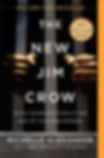
The New Jim Crow: Mass Incarceration in the Age of Colorblindness
Michelle Alexander (2020)
Seldom does a book have the impact of Michelle Alexander’s The New Jim Crow. Since it was first published in 2010, it has been cited in judicial decisions and has been adopted in campus-wide and community-wide reads; it helped inspire the creation of the Marshall Project and the new $100 million Art for Justice Fund; it has been the winner of numerous prizes, including the prestigious NAACP Image Award; and it has spent nearly 250 weeks on the New York Times bestseller list. Most important of all, it has spawned a whole generation of criminal justice reform activists and organizations motivated by Michelle Alexander’s unforgettable argument that “we have not ended racial caste in America; we have merely redesigned it.” As the Birmingham News proclaimed, it is “undoubtedly the most important book published in this century about the U.S.” The new tenth-anniversary edition includes a preface by Michelle Alexander that discusses the impact the book has had and the state of the criminal justice reform movement today.
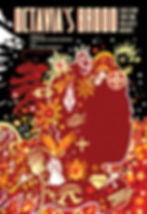
Octavia's Brood: Science Fiction Stories from Social Justice Movements
Edited by adrienne maree brown and Walidah Imarisha (2015)
Whenever we envision a world without war, without prisons, without capitalism, we are producing speculative fiction. Organizers and activists envision, and try to create, such worlds all the time. Walidah Imarisha and adrienne maree brown have brought twenty of them together in the first anthology of short stories to explore the connections between radical speculative fiction and movements for social change. The visionary tales of Octavia’s Brood span genres— sci-fi, fantasy, horror, magical realism — but all are united by an attempt to inject a healthy dose of imagination and innovation into our political practice and to try on new ways of understanding ourselves, the world around us, and all the selves and worlds that could be. The collection is rounded off with essays by Tananarive Due and Mumia Abu-Jamal, and a preface by Sheree Renée Thomas.

I'm Still Here: Black Dignity in a World Made for Whiteness
Austin Channing Brown (2018)
In a time when nearly all institutions (schools, churches, universities, businesses) claim to value "diversity" in their mission statements, I'M STILL HERE is a powerful account of how and why our actions so often fall short of our words. Austin writes in breathtaking detail about her journey to self-worth and the pitfalls that kill our attempts at racial justice, in stories that bear witness to the complexity of America's social fabric--from Black Cleveland neighborhoods to private schools in the middle-class suburbs, from prison walls to the boardrooms at majority-white organizations. For readers who have engaged with America's legacy on race through the writing of Ta-Nehisi Coates and Michael Eric Dyson, I'M STILL HERE is an illuminating look at how white, middle-class, Evangelicalism has participated in an era of rising racial hostility, inviting the reader to confront apathy, recognize God's ongoing work in the world, and discover how blackness -- if we let it -- can save us all.
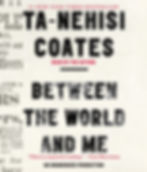
Between the World and Me
Ta-Nehisi Coates (2015)
In a profound work that pivots from the biggest questions about American history and ideals to the most intimate concerns of a father for his son, Ta-Nehisi Coates offers a powerful new framework for understanding our nation’s history and current crisis. Americans have built an empire on the idea of “race,” a falsehood that damages us all but falls most heavily on the bodies of black women and men—bodies exploited through slavery and segregation, and, today, threatened, locked up, and murdered out of all proportion. What is it like to inhabit a black body and find a way to live within it? And how can we all honestly reckon with this fraught history and free ourselves from its burden?
Between the World and Me is Ta-Nehisi Coates’s attempt to answer these questions in a letter to his adolescent son. Coates shares with his son—and readers—the story of his awakening to the truth about his place in the world through a series of revelatory experiences, from Howard University to Civil War battlefields, from the South Side of Chicago to Paris, from his childhood home to the living rooms of mothers whose children’s lives were taken as American plunder. Beautifully woven from personal narrative, reimagined history, and fresh, emotionally charged reportage, Between the World and Me clearly illuminates the past, bracingly confronts our present, and offers a transcendent vision for a way forward.

White Fragility: Why It’s So Hard For White People To Talk About Racism
Robin DiAngelo, PhD, 2018, Beacon Press White people in North America live in a social environment that protects and insulates them from race-based stress. This insulated environment of racial protection builds white expectations for racial comfort while at the same time lowering the ability to tolerate racial stress. Although white racial insulation is somewhat mediated by social class (with poor and working class urban whites being generally less racially insulated than suburban or rural whites), the larger social environment insulates and protects whites as a group through institutions, cultural representations, media, school textbooks, movies, advertising, and dominant discourses. Racial stress results from an interruption to what is racially familiar. In turn, whites are often at a loss for how to respond in constructive ways, as we have not had to build the cognitive or effective skills or develop the stamina that that would allow for constructive engagement across racial divides. leading to what I refer to as White Fragility. White Fragility is a state in which even a minimum amount of racial stress becomes intolerable, triggering a range of defensive moves. These moves include the outward display of emotions such as anger, fear, and guilt, and behaviors such as argumentation, silence, and leaving the stress-inducing situation. These behaviors, in turn, function to reinstate white racial equilibrium. This book explicates the dynamics of White Fragility and how we might build our capacity in the on-going work towards racial justice. You can also access a FREE reader's guide here!

What Does It Mean to be White? Developing White Racial Literacy.
Robin DiAngelo, PhD (2016) What does it mean to be white in a society that proclaims race meaningless yet is deeply divided by race? In the face of pervasive racial inequality and segregation, most whites cannot answer that question. Robin DiAngelo argues that a number of factors make this question difficult for whites—miseducation about what racism is; ideologies such as individualism and colorblindness; defensiveness; and tendency to protect (rather than expand) our worldviews. These factors contribute to what she terms white racial illiteracy. Speaking as a white person to other white people, Dr. DiAngelo clearly and compellingly takes readers through an analysis of white socialization. She describes how race shapes the lives of white people, explains what makes racism so hard for whites to see, identifies common white racial patterns, and speaks back to popular white narratives that work to deny racism. Written as an accessible introduction to white identity from an anti-racist framework, What Does It Mean To Be White? is an invaluable resource for members of diversity and anti-racism programs and study groups and students of sociology, psychology, education, and other disciplines.

Antagonists Advocates and Allies: The Wake Up Call Guide for White Women Who Want to Become Allies with Black Women.
Catrice M. Jackson, MS LMHP (2019)
Dear White Women: In the lives of Black women, women of color, you are an Antagonist, Advocate or Ally. This is your WAKE UP CALL; a dramatically sobering reality check to wake you up from the detrimental denial of your White Privilege. This book delivers uncomfortable truths and painful realities about the conscious and unintentional pain you have inflicted on Black women, women of color and shares how you must use your power to eliminate racism and stop the hypocrisy within the feminine movement. Antagonists, Advocates and Allies boldly beckons White women to come from behind their White Picket Fence, enter the classroom of “Living While Black and Brown 101”, take a seat, don’t talk, listen and finally hear what you’ve failed to hear for centuries. The elimination of racism starts and ends with you. It’s time to roll up your sleeves and get to work.This guide helps White women identify what role they play in the lives of Black women and women of color and provides valuable interpersonal insight and strategies to help them transition from Antagonist to Advocate and Advocate to Ally. This is a must-have guide for White women who want to unlearn their personal racism and use their White Privilege to help improve relationships with Black women and women of color, foster racial harmony and advance feminism and the women's empowerment movement so that it becomes intersectional and inclusive of all women.

How to Be an Antiracist
Ibram X. Kendi (2019)
Antiracism is a transformative concept that reorients and reenergizes the conversation about racism - and, even more fundamentally, points us toward liberating new ways of thinking about ourselves and each other. At its core, racism is a powerful system that creates false hierarchies of human value; its warped logic extends beyond race, from the way we regard people of different ethnicities or skin colors to the way we treat people of different sexes, gender identities, and body types. Racism intersects with class and culture and geography and even changes the way we see and value ourselves. In How to Be an Antiracist, Kendi takes readers through a widening circle of antiracist ideas - from the most basic concepts to visionary possibilities - that will help listeners see all forms of racism clearly, understand their poisonous consequences, and work to oppose them in our systems and in ourselves. Kendi weaves an electrifying combination of ethics, history, law, and science with his own personal story of awakening to antiracism. This is an essential work for anyone who wants to go beyond the awareness of racism to the next step: contributing to the formation of a just and equitable society.
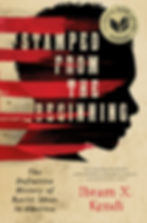
Stamped from the Beginning: The Definitive History of Racist Ideas in America
Ibram X. Kendi (2016)
Winner of the 2016 National Book Award for Nonfiction A New York Times best-seller in race and civil rights Finalist for the 2016 National Book Critics Circle Award for Nonfiction "The most ambitious book of 2016" (Washington Post) A Boston Globe Best Book of 2016 A Washington Post Notable Book of 2016 A Chicago Review of Books Best Nonfiction Book of 2016 A Root Best Book of 2016 A BuzzFeed Best Nonfiction Book of 2016 A Bustle Best Book of 2016 Nominated for 2016 NAACP Image Award for Outstanding Literary Work of Nonfiction Finalist for the 2017 Hurston/Wright Legacy Award in Nonfiction A Kirkus Best History Book of 2016 A Kirkus Best Book of 2016 to explain current politics A Kirkus Best Heartrending Nonfiction Book of 2016 An Entropy Best Nonfiction Book of 2016 The Washington Post 2016 summer reading list
Some Americans cling desperately to the myth that we are living in a post-racial society, that the election of the first Black president spelled the doom of racism. In fact, racist thought is alive and well in America - more sophisticated and more insidious than ever. And as award-winning historian Ibram X. Kendi argues in Stamped from the Beginning, if we have any hope of grappling with this stark reality, we must first understand how racist ideas were developed, disseminated, and enshrined in American society.
In this deeply researched and fast-moving narrative, Kendi chronicles the entire story of anti-Black racist ideas and their staggering power over the course of American history. Stamped from the Beginning uses the life stories of five major American intellectuals - Puritan minister Cotton Mather, Thomas Jefferson, abolitionist William Lloyd Garrison, W.E.B. Du Bois, and legendary activist Angela Davis. - to offer a window into the contentious debates between assimilationists and segregationists and between racists and antiracists.

when they call you a terrorist: a black lives matter memoir
patrisse khan-cullors & asha bandele (2017)
Raised by a single mother in an impoverished neighborhood in Los Angeles, Patrisse Khan-Cullors experienced firsthand the prejudice and persecution Black Americans endure at the hands of law enforcement. For Patrisse, the most vulnerable people in the country are Black people. Deliberately and ruthlessly targeted by a criminal justice system serving a white privilege agenda, Black people are subjected to unjustifiable racial profiling and police brutality. In 2013, when Trayvon Martin’s killer went free, Patrisse’s outrage led her to co-found Black Lives Matter with Alicia Garza and Opal Tometi. Condemned as terrorists and as a threat to America, these loving women founded a hashtag that birthed the movement to demand accountability from the authorities who continually turn a blind eye to the injustices inflicted upon people of Black and Brown skin.
Championing human rights in the face of violent racism, Patrisse is a survivor. She transformed her personal pain into political power, giving voice to a people suffering inequality and a movement fueled by her strength and love to tell the country―and the world―that Black Lives Matter.
When They Call You a Terrorist is Patrisse Khan-Cullors and asha bandele’s reflection on humanity. It is an empowering account of survival, strength and resilience and a call to action to change the culture that declares innocent Black life expendable.

Uprooting Racism: How White People Can Work for Racial Justice.
Paul Kivel (2017)
In 2016, the president-elect of the United States openly called for segregation and deportation based on race and religion. Meanwhile, inequalities in education, housing, health care, and the job market continue to prevail, while increased insecurity and fear have led to an epidemic of scapegoating and harassment of people of color. Yet, recent polls show that only thirty-one percent of white people in the United States believe racism is a major societal problem; at the same time, resistance is strong, as highlighted by indigenous struggles for land and sovereignty and the Movement for Black Lives. Completely revised and updated, this fourth edition of Uprooting Racism offers a framework around neoliberalism and interpersonal, institutional, and cultural racism, along with stories of resistance and white solidarity. It provides practical tools and advice on how white people can work as allies for racial justice, engaging the reader through questions, exercises, and suggestions for action, and includes a wealth of information about specific cultural groups such as Muslims, people with mixed heritage, Native Americans, Jews, recent immigrants, Asian Americans, and Latino/as. Paul Kivel is an award-winning author and an accomplished trainer and speaker. He has been a social justice activist, a nationally and internationally recognized anti-racism educator, and an innovative leader in violence prevention for over forty years.
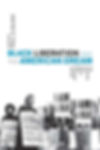
Black Liberation & the American Dream: The Struggle for Racial and Economic Justice: Analysis, Strategy, Readings
Edited by Paul Le Blanc (2017)
Considering the connections between class and racial oppression, and the often marginalized role of the Left in antiracist struggles, Le Blanc skillfully introduces key texts from crucial figures in African American radicalism: Frederick Douglass, Martin Delany, Sojourner Truth, Harriet Tubman, Ida B. Wells, Booker T. Washington, Marcus Garvey, W. E. B. Du Bois, Paul Robeson, C. L. R. James, A. Philip Randolph, Martin Luther King Jr., Bayard Rustin, Malcolm X, Ella Baker, and others. This combination of a rich analytical understanding with key primary texts makes Black Liberation and the American Dream a unique and invaluable resource for those engaged in contemporary struggles. It is a crucial text for activists and scholars alike.

The Possessive Investment in Whiteness: How White People Profit from Identity Politics
George Lipsitz (2018)
From the introduction:
"This book argues that public policy and private prejudice work together to create a 'possessive investment in whiteness' that is responsible for the racialized hierarchies of our society. I use the term possessive investment both literally and figuratively. Whiteness has a cash value: it accounts for advantages that come to individuals through profits made from housing secured in discriminatory markets, through the unequal educational opportunities available to children of different races, through insider networks that channel employment opportunities to the relatives and friends of those who have profited most from present and past racial discrimination, and especially through intergenerational transfers of inherited wealth that pass on the spoils of discrimination to succeeding generations. I argue that white Americans are encouraged to invest in whiteness, to remain true to an identity that provides them with resources, power and opportunity. This whiteness is, of course, a delusion, a scientific and cultural fiction that like all racial identities has no valid foundation in biology or anthropology. White is, however, a social fact, an identity created and continued with all-too-real consequences for the distribution of wealth, prestige, power, and opportunity...
The possessive investment in whiteness is a matter of power, not simply of prejudice. Whiteness is more a condition than a color. It is a structured advantage that is impersonal, institutional, collective, and cumulative. Like all forms of racism, the possessive investment in whiteness exaggerates small differences in appearance to create large differences in condition. It concerns property as well as pigment, assets as well as attitudes. It manifests itself through practices that create differential access to wealth, health, housing, education, jobs, and justice."

No Ashes in the Fire: Coming of Age Black & Free in America
Darnell L. Moore (2018)
When Darnell Moore was fourteen, three boys from his neighborhood tried to set him on fire. They cornered him while he was walking home from school, harassed him because they thought he was gay, and poured a jug of gasoline on him. He escaped, but just barely. It wasn't the last time he would face death. Three decades later, Moore is an award-winning writer, a leading Black Lives Matter activist, and an advocate for justice and liberation. In No Ashes in the Fire, he shares the journey taken by that scared, bullied teenager who not only survived, but found his calling. Moore's transcendence over the myriad forces of repression that faced him is a testament to the grace and care of the people who loved him, and to his hometown, Camden, NJ, scarred and ignored but brimming with life. Moore reminds us that liberation is possible if we commit ourselves to fighting for it, and if we dream and create futures where those who survive on society's edges can thrive. No Ashes in the Fire is a story of beauty and hope-and an honest reckoning with family, with place, and with what it means to be free.

An African American and Latinx History of the United States
Paul Ortiz (2018)
Spanning more than two hundred years, An African American and Latinx History of the United States is a revolutionary, politically charged narrative history, arguing that the “Global South” was crucial to the development of America as we know it. Scholar and activist Paul Ortiz challenges the notion of westward progress as exalted by widely taught formulations like “manifest destiny” and “Jacksonian democracy,” and shows how placing African American, Latinx, and Indigenous voices unapologetically front and center transforms US history into one of the working class organizing against imperialism.
Drawing on rich narratives and primary source documents, Ortiz links racial segregation in the Southwest and the rise and violent fall of a powerful tradition of Mexican labor organizing in the twentieth century, to May 1, 2006, known as International Workers’ Day, when migrant laborers—Chicana/os, Afrocubanos, and immigrants from every continent on earth—united in resistance on the first “Day Without Immigrants.” As African American civil rights activists fought Jim Crow laws and Mexican labor organizers warred against the suffocating grip of capitalism, Black and Spanish-language newspapers, abolitionists, and Latin American revolutionaries coalesced around movements built between people from the United States and people from Central America and the Caribbean. In stark contrast to the resurgence of “America First” rhetoric, Black and Latinx intellectuals and organizers today have historically urged the United States to build bridges of solidarity with the nations of the Americas.
Incisive and timely, this bottom-up history, told from the interconnected vantage points of Latinx and African Americans, reveals the radically different ways that people of the diaspora have addressed issues still plaguing the United States today, and it offers a way forward in the continued struggle for universal civil rights.
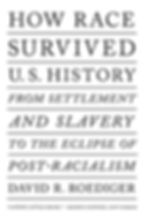
How Race Survived U.S. History: From Settlement and Slavery to the Eclipse of Post-Racialism
David R. Roediger (2019)
In this absorbing chronicle of the role of race in US history, David R. Roediger explores how the idea of race was created and recreated from the 1600s to the present day. From the late seventeenth century -- the era in which DuBois located the emergence of "whiteness" -- through the American revolution and the Civil War, to the Civil Rights Movement and the emergence of the American empire, this book reveals how race did far more than persist as an exception in a progressive national history. Roediger examines how race intersected all that was dynamic and progressive in US history, from democracy and economic development to migration and globalization. This masterful account shows how race remains at the heart of American life in the twenty-first century.

The Color of Law: A Forgotten History of How Our Government Segregated America
Richard Rothstein (2017)
The Color of Law offers “the most forceful argument ever published on how federal, state, and local governments gave rise to and reinforced neighborhood segregation” (William Julius Wilson). Exploding the myth of de facto segregation arising from private prejudice or the unintended consequences of economic forces, Rothstein describes how the American government systematically imposed residential segregation: with undisguised racial zoning; public housing that purposefully segregated previously mixed communities; subsidies for builders to create whites-only suburbs; tax exemptions for institutions that enforced segregation; and support for violent resistance to African Americans in white neighborhoods. A groundbreaking, “virtually indispensable” study that has already transformed our understanding of twentieth-century urban history (Chicago Daily Observer), The Color of Law forces us to face the obligation to remedy our unconstitutional past.
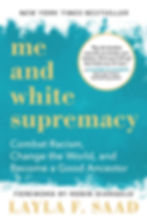
Me and White Supremacy: Combat Racism, Change the World, and Become a Good Ancestor
Layla F. Saad (2020)
When Layla Saad began an Instagram challenge called #meandwhitesupremacy, she never predicted it would spread as widely as it did. She encouraged people to own up and share their racist behaviors, big and small. She was looking for truth, and she got it. Thousands of people participated in the challenge, and over 90,000 people downloaded the Me and White Supremacy Workbook. The updated and expanded Me and White Supremacy takes the work deeper by adding more historical and cultural contexts, sharing moving stories and anecdotes, and including expanded definitions, examples, and further resources. Awareness leads to action, and action leads to change. The numbers show that people are ready to do this work - let’s give it to them.

The Racial Healing Handbook: Practical Activities to Help You Challenge Privilege, Confront Systemic Racism & Engage in Collective Healing
Anneliese A. Singh (2019)
Healing from racism is a journey that often involves reliving trauma and experiencing feelings of shame, guilt, and anxiety. This journey can be a bumpy ride, and before we begin healing, we need to gain an understanding of the role history plays in racial/ethnic myths and stereotypes. In so many ways, to heal from racism, you must re-educate yourself and unlearn the processes of racism. This book can help guide you.The Racial Healing Handbook offers practical tools to help you navigate daily and past experiences of racism, challenge internalized negative messages and privileges, and handle feelings of stress and shame. You’ll also learn to develop a profound racial consciousness and conscientiousness, and heal from grief and trauma. Most importantly, you’ll discover the building blocks to creating a community of healing in a world still filled with racial microaggressions and discrimination.
This book is not just about ending racial harm — it is about racial liberation. This journey is one that we must take together. It promises the possibility of moving through this pain and grief to experience the hope, resilience, and freedom that helps you not only self-actualize, but also makes the world a better place.

The Cost of Privilege: Taking on the System of White Supremacy and Racism
Chip Smith (2007)
The Cost of Privilege takes readers from the creation of the white race over three centuries ago to the present-day myth of a colorblind society; from the intersections of class, gender, and race to the concrete benefits and harsh underside of the privileges white people experience every day; from the victories when people allied across the color line to the failures of some of those alliances to hold; from personal transformations to international struggles.

How We Fight White Supremacy
Akiba Solomon and Kenrya Rankin (2019)
Many of us are facing unprecedented attacks on our democracy, our privacy, and our hard-won civil rights. If you're black in the US, this is not new. As Colorlines editors Akiba Solomon and Kenrya Rankin show, black Americans subvert and resist life-threatening forces as a matter of course. In this book, leading organizers, artists, journalists, comedians, and filmmakers offer wisdom on how they fight white supremacy. It's a must-listen for anyone new to resistance work, and for the next generation of leaders building a better future.
Featuring contributions from: Ta-Nehisi Coates, Tarana Burke, Harry Belafonte, Adrienne Maree Brown, Alicia Garza, Patrisse Khan-Cullors, Reverend Dr. Valerie Bridgeman, Kiese Laymon, Jamilah Lemieux, Robin D. G. Kelley, Damon Young, Michael Arceneaux, Hanif Abdurraqib, Dr. Yaba Blay, Diamond Stingily, Amanda Seales, Imani Perry, Denene Millner, Kierna Mayo, John Jennings, Dr. Joy Harden Bradford, Tongo Eisen-Martin.

White Like Me: Reflections on Race from a Privileged Son
Tim Wise (2011)
With a new preface and updated chapters, White Like Me is one-part memoir, one-part polemical essay collection. It is a personal examination of the way in which racial privilege shapes the daily lives of white Americans in every realm: employment, education, housing, criminal justice, and elsewhere.
Using stories from his own life, Tim Wise demonstrates the ways in which racism not only burdens people of color, but also benefits, in relative terms, those who are “white like him.” He discusses how racial privilege can harm whites in the long run and make progressive social change less likely. He explores the ways in which whites can challenge their unjust privileges, and explains in clear and convincing language why it is in the best interest of whites themselves to do so. Using anecdotes instead of stale statistics, Wise weaves a narrative that is at once readable and yet scholarly, analytical and yet accessible.
Ideas of other essential reading for white folks working to become anti-racist?
Drop us a line and let us know! Email us at info@justrootsconsulting.com
